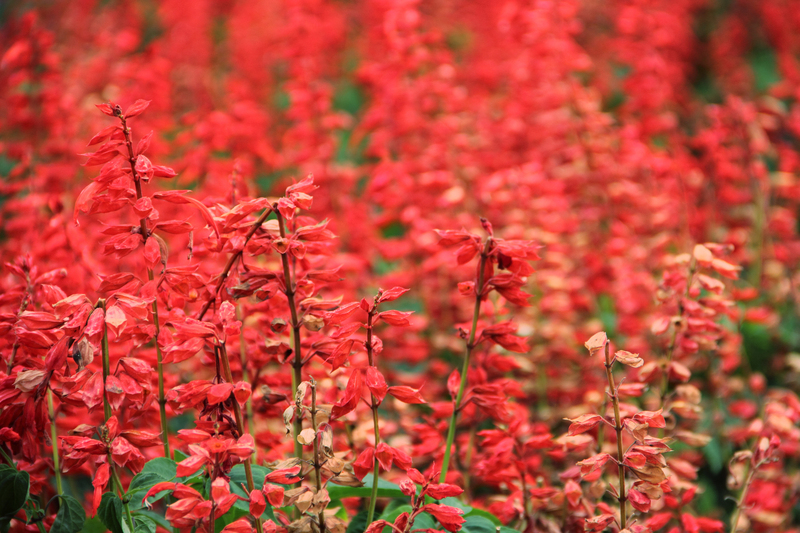Transform Your Garden with Smart Weed Control Practices
Posted on 25/09/2025
Transform Your Garden with Smart Weed Control Practices
Are you tired of battling stubborn weeds that detract from the beauty and productivity of your garden? If so, you're not alone. Weeds can quickly take over garden beds, choke out desirable plants, and create an untidy appearance. Luckily, smart weed control practices can help you keep your garden lush, healthy, and thriving. In this comprehensive guide, you'll discover eco-friendly, effective, and sustainable methods to control weeds, transforming your backyard into a flourishing oasis.
Why Is Weed Management Essential for a Beautiful Garden?
Weeds aren't just an eyesore; they compete aggressively with your flowers, vegetables, and shrubs for sunlight, nutrients, and moisture. Moreover, unchecked weeds can harbor pests and diseases that threaten your cultivated plants. By mastering modern weed control strategies, you not only improve the aesthetics of your outdoor spaces but also support plant health and maximize yield.
- Weeds sap nutrients and water from desirable plants.
- Unmanaged weeds can spread rapidly and dominate garden beds.
- Effective weed management reduces the risk of plant disease and pest infestations.

Understanding the Types of Garden Weeds
Before implementing smart weed control in your garden, it's vital to understand the different types of weeds you might encounter:
- Annual Weeds: Complete their life cycle in a single season. Examples include crabgrass and chickweed.
- Biennial Weeds: Take two years to complete their life cycle. Common mullein and burdock fall into this category.
- Perennial Weeds: Live for three or more years and can be especially tough to eradicate. Think dandelions, bindweed, and thistle.
How to Transform Your Garden with Innovative Weed Control Methods
1. Start with Prevention: The Smartest Weed Control Strategy
The best way to control weeds is to prevent them from establishing in the first place. Consider these preventive techniques for smart weed suppression:
- Mulching: Mulch acts as a barrier, blocking sunlight and preventing weed seeds from germinating. Use organic mulches like straw, wood chips, or shredded leaves to enrich the soil while suppressing weeds.
- Dense Planting: Filling garden beds with robust, ground-covering plants leaves little space for weeds to take root.
- Healthy Soil: Fertile, well-structured soil promotes vigorous plant growth. Vigorous plants are more capable of outcompeting weeds for resources.
- Use Weed-Free Compost: Ensure compost is fully broken down to avoid introducing weed seeds.
2. Manual Weed Removal: The Tried-and-True Technique
When performed correctly, hand weeding and hoeing can be incredibly effective, especially for small gardens or spot-treating larger beds. For the best results:
- Remove weeds when the soil is moist--this helps you pull out roots thoroughly.
- Use specialized tools--like a hand fork, hoe, or a weeding knife--for tough roots and established perennials.
- Target weeds before they can set seed to significantly reduce future weed problems.
3. Employ Mulching for Sustainable Weed Suppression
Mulching remains one of the most effective and sustainable weed control practices. Not only does it look attractive, but it can significantly reduce the amount of time spent weeding. Here are some top mulching tips:
- Organic mulches (straw, bark, compost) improve soil health while suppressing weeds.
- Inorganic mulches (landscape fabric, black plastic) offer long-term weed suppression but may not provide soil-enriching benefits.
- Apply mulch 2-3 inches thick and replenish as needed throughout the growing season.
- Ensure mulch doesn't touch plant stems to prevent rot and pests.
4. Utilize Smart Technology for Weed Control
Modern gardens can now benefit from technology-driven weed management solutions. Try integrating these tech-savvy approaches into your garden maintenance routine:
- Weed Barrier Fabrics: These permeable fabrics block weeds while allowing water and nutrients to reach plant roots.
- Solarization: By covering soil with clear plastic during hot months, you can use the sun's energy to kill weeds and weed seeds. This chemical-free process is highly effective for large plots.
- Robotic Weeders: New autonomous tools use sensors and artificial intelligence to identify and remove weeds, reducing labor and improving efficiency.
5. Natural and Organic Weed Control Solutions
If you want to avoid synthetic chemicals, try these eco-friendly weed management techniques:
- Boiling Water: Target established weeds by pouring boiling water directly onto them. This method works best on cracks in pavement or driveways.
- Homemade Vinegar Sprays: Mix vinegar with salt and dish soap for an organic herbicide. Use with caution, as vinegar can harm valuable plants if not applied carefully.
- Flame Weeding: A propane torch can singe weeds in gravel or paths, but should be used only by adults and with appropriate safety precautions.
Proactive Seasonal Weed Maintenance
Successful weed control in your garden is an ongoing effort. The changing seasons bring new weed challenges and opportunities for smart management:
- Spring: Begin with thorough bed clean-up. Remove overwintered weeds before they can grow and set seed.
- Summer: Apply new mulch as needed and hand-weed regularly to keep beds tidy. Monitor for invasive perennials.
- Fall: Remove plant debris and till garden beds to expose and eradicate remaining weeds and seeds.
- Winter: Plan crop rotations and order mulch for early spring application.
Plant Selection for Weed Suppression
Strategic plant choices play a decisive role in long-term weed control. Certain ground covers and dense plantings can outcompete weeds naturally. Consider adding these to your landscape:
- Creeping Thyme: Forms a mat that resists weed intrusion and offers lovely flowers.
- Sweet Woodruff: Ideal for shady spots, suppressing weeds under trees and shrubs.
- Ajuga (Bugleweed): Spreads quickly and fills gaps in garden edges and borders.
- Sedges and Ornamental Grasses: Their thick root systems discourage many common weeds.
Smart Weed Control and Environmental Stewardship
Adopting eco-friendly garden weed control methods not only protects your plants but also benefits the wider environment:
- Reduces reliance on synthetic herbicides that can contaminate soil and waterways.
- Preserves beneficial soil organisms essential for plant health and soil structure.
- Minimizes garden waste through composting and clever mulching.
Common Mistakes to Avoid in Garden Weed Management
To ensure your garden weed control practices are effective, steer clear of these frequent errors:
- Ignoring weeds until they flower or seed: This dramatically increases your work in future seasons.
- Improper mulch application: Too thin a layer won't block weeds, while overly thick mulch can suffocate roots.
- Disturbing soil unnecessarily: Frequent digging exposes dormant weed seeds to sunlight, encouraging sprouting.
- Relying solely on herbicides: Overuse can damage your desired plants and disrupt the ecological balance of your garden.
Integrated Weed Management: Combining Smart Practices
For optimal garden weed suppression, the best approach is an integrated one--combining multiple techniques tailored to your specific site conditions, soil type, and gardening style.
- Mulch generously in all beds and reapply at least annually.
- Rotate crops in vegetable gardens to disrupt the life cycles of persistent weeds.
- Promote dense plantings and ground covers to minimize open soil where weeds can invade.
- Hand-weed regularly--frequent small efforts prevent overwhelming weed problems.
- Monitor and adapt--be vigilant and adjust management strategies based on what's effective in your garden.

Frequently Asked Questions about Smart Weed Control
How often should I mulch my garden beds?
It's a good idea to mulch once a year, typically in spring after the soil has warmed but before weed seeds have time to germinate. Replenish as needed throughout the growing season.
Do I need to remove all weeds manually?
Manual removal is vital for established perennial weeds. For annual weeds and smaller infestations, mulching and dense planting may be sufficient. Combining methods yields the best long-term results.
Are organic herbicides effective for garden weed management?
Organic herbicides, like vinegar-based sprays, can control young weeds on patios, sidewalks, and gravel areas. However, they often fail to eradicate deeply rooted perennials and should be used alongside other cultural and mechanical controls.
Conclusion: A Smarter, Greener Approach to Weed Control
Transforming your garden is well within reach when you adopt a thoughtful, smart weed control program. By combining prevention, manual techniques, mulching, innovative technologies, and environmentally friendly approaches, you can enjoy a healthier, more vibrant landscape--one where your chosen plants thrive, and weeds are kept at bay.
Start implementing these proven, sustainable strategies today and watch your garden flourish like never before. A weed-free, inviting outdoor haven is possible with dedication, smart choices, and a little creative gardening!
```Latest Posts
Transform Your Garden with Smart Weed Control Practices
Strategies for managing garden spaces with dogs
Precision Hedge Trimming for Perfect Gardens
Embarking on Transformation: First Steps for a Garden Makeover



